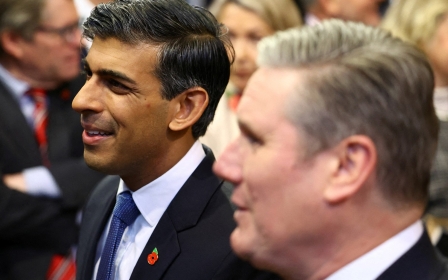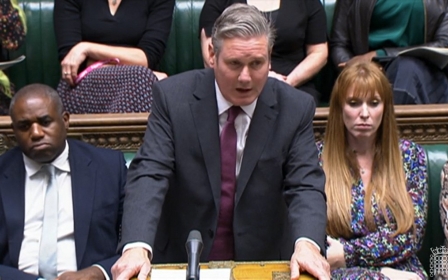UK Muslim group issues 18 ‘demands’ for Labour to win back trust lost over Gaza

A Muslim advocacy group has issued a set of 18 "demands" for the UK's opposition Labour party to win back the support of the community.
Labour is the front-runner in opinion polls ahead of the UK general elections set to be held later this year but its declining support amongst Muslims over Israel's war on Gaza has already cost it a parliamentary seat during a recent by-election and several council seats in local elections held last week.
The Muslim Vote (TMV), an initiative backed by dozens of Muslim organisations in the UK, issued a list of ways Labour could restore support for the party among Muslims.
Its top demands are related to the Palestinian issue and include a call for Labour leader Keir Starmer to apologise for his earlier support of Israeli actions, to back sanctions on companies operating in settlements in the occupied West Bank, and support the recognition of Palestinian statehood.
Other demands include a travel ban on Israelis involved in the war and an end to ties with Israel’s military.
New MEE newsletter: Jerusalem Dispatch
Sign up to get the latest insights and analysis on Israel-Palestine, alongside Turkey Unpacked and other MEE newsletters
Starmer’s position on Israel’s war on Gaza has been the biggest driver of the fall in support amongst Muslims.
Initially, he backed the Israeli decision to cut off water, electricity and food supplies, which amounts to a war crime under international law.
The Labour leader later walked back his comments but refused to call for a ceasefire, another position he has since changed his line on.
Labour is now calling for a humanitarian ceasefire, but that has not helped to repair relations with the Muslim community, which is overwhelmingly against the war on Gaza and has called on British politicians to use their influence to stop Israel’s military operations.
Muslim voters were pivotal in helping former Labour MP George Galloway return to parliament during a by-election in Rochdale on 29 February.
Galloway made Gaza a central issue in his campaign and Labour’s own candidate lost the party's backing after suggesting that Israel had allowed the Hamas-led attacks of 7 October to happen.
While the party gained 186 new local council seats in elections on 2 May, it lost tens of thousands of votes in mayoral contests in the West Midlands and elsewhere.
According to analysis by University of Southampton academic Will Jennings, in places where Muslims make up more than a fifth of the population, Labour has experienced an average drop in support of 18 percent.
An important finding in Jennings's research was that the party's Gaza stance had also cost Labour support amongst people who are not Muslim.
A balancing act
The worry amongst Labour leaders is that if support amongst the Muslim community drops too significantly, their expected majority at the next election could be imperilled.
Ellie Reeves, the party’s deputy campaign coordinator, told the BBC Breakfast programme that “a lot of listening needs to be done”.
“We know that we've got a great deal of work to do to rebuild trust with Muslim communities,” Reeves, who represents the London constituency of Lewisham and Penge, said during the broadcast on Saturday.
But the Muslim community is not the only source of political pressure on the Labour leadership.
TMV’s list of “demands” has not been received positively by the right-wing press, which Labour is courting in order to syphon off support from the Conservative Party. The Daily Mail called the list "dangerous" in the headline of an article about the TMV demands.
Abubakr Nanabawa, the spokesperson for TMV, told Middle East Eye the negative press coverage “was not a surprise” and a “typical” response to Muslims trying to become politically active.
'Many like me were not from the hard left but were centrists who felt our voices were ignored on every level'
- Hasan Patel, former Labour member
“The reaction is an attempt to dismiss these legitimate concerns and paint Muslims as the 'other' as they seek to mobilise in the upcoming general election,” he said, adding that no one from Labour had reached out to his group.
“We currently have had no formal communication with the Labour Party, who have not made any concrete effort to reach out to Muslim communities and have instead spent the last few months demonising Muslim voters.”
While not addressing the list, The Times columnist Daniel Finkelstein penned a column titled “Keir Starmer doesn’t need Gaza extremists’ vote”, in which he argued that no policy position Labour could enact would bring back voters it lost due to Gaza.
He wrote: “The campaigners want Palestine free from Israel from the river to the sea. And they are part of a coalition with a broader world view that sees Israel as a symbol of capitalism and the western alliance, both of which they wish to destroy.”
Many former Labour supporters within the Muslim community would disagree with Finkelstein’s assessment.
In an article co-written with University College Dublin academic Scott Lucas for the Byline Times, former Labour member and communications specialist Hasan Patel wrote that the party’s relationship with the Muslim community was not beyond repair.
“British Muslims who resigned as members of the party did so on principle. Many like me were not from the hard left but were centrists who felt our voices were ignored on every level when we just wanted a robust opposition to the mass killing in Gaza,” Patel wrote.
“Accepting, engaging, and reasserting a social contract with British Muslim voters cannot be hollow promises or a rejection of their concerns: it must be an active process of dialogue.”
Middle East Eye delivers independent and unrivalled coverage and analysis of the Middle East, North Africa and beyond. To learn more about republishing this content and the associated fees, please fill out this form. More about MEE can be found here.





